Trump flags claims US bank helped skirt Iran sanctions

US president Donald Trump has spotlighted whistleblower allegations that Standard Chartered Bank’s New York branch moved billions of dollars to entities linked to Iran and Hezbollah.

US president Donald Trump has spotlighted whistleblower allegations that Standard Chartered Bank’s New York branch moved billions of dollars to entities linked to Iran and Hezbollah.
Sharing a report from The Gateway Pundit on Truth Social Wednesday, the president cited claims that at least $9.6 billion in illicit payments were cleared through the branch to names on the US Treasury’s sanctions list, including designated terrorist organizations.
The allegations, first published on July 22 and updated with new material from bank insiders, center on transactions said to involve Euro African Group Ltd—controlled by Hezbollah financier Mohammad Bazzi—alongside Koussani Steel, Kuwait Automotive Group, Bank of Algeria, Iranian oil trading intermediaries, and other sanctioned entities.
“With all oil trade required to be in US dollar currency, China is using SCB and its NYC branch to buy Iranian oil in US dollars,” the story reads.
The Trump administration has imposed a sweeping sanctions campaign on Iran aimed at curbing its oil sales network, while tightening enforcement measures to cut off Tehran’s access to the US financial system and global banking channels.
In June, however, Trump announced on social media that China could now buy Iranian oil — a shift from his previous hardline stance.
China remains the only major buyer of Iranian crude, taking in the vast majority of Tehran’s exports. Despite years of sanctions and stepped-up enforcement, the flow of oil to Chinese refiners has not been halted, with shipments often routed through intermediaries or mislabeled to disguise their origin.
According to The Gateway Pundit, the case is supported by 40,000 internal emails containing foreign exchange trade records.
The report alleges that senior officials, including New York Attorney General Letitia James, were briefed on the matter in early 2024 but took no action.
Trump, in his post, called James “a disgrace” but offered no further details on what action he believed should follow.
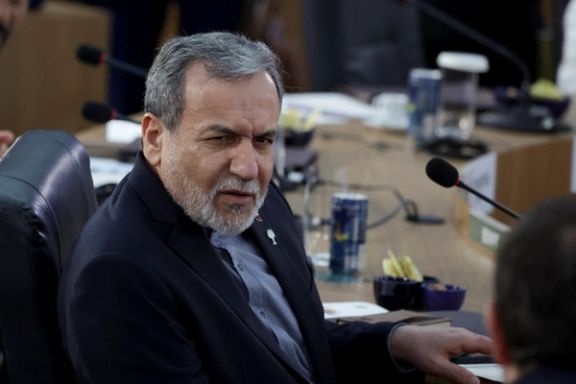
Iran’s foreign minister on Wednesday accused the United States and its allies of imposing sanctions that cause mass casualties, citing a study he said showed they may be as deadly as armed conflict.
“Western regimes have long claimed that sanctions are a bloodless alternative to war,” Abbas Araghchi wrote on social media platform X. “Reality check: New study by The Lancet says unilateral sanctions, particularly by the US, may be as lethal as war. 500+k lives claimed annually since 1970s, mostly children and the elderly.”
Araghchi called for international recognition of sanctions as crimes against humanity and urged targeted countries to unite against them.
“It is high time for inhumane sanctions imposed by the US and its accomplices to be recognized as crimes against humanity,” he said. “Targeted nations should coordinate efforts to forge unified and collective response.”
The remarks come as Iran faces the potential reimposition of United Nations sanctions under the “snapback” mechanism of the 2015 nuclear deal, with European powers warning of action if Tehran does not return to talks by the end of August.
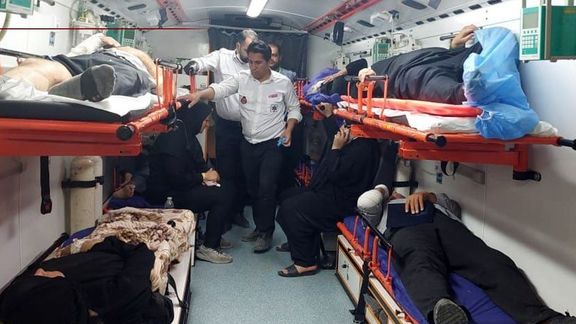
Five Iranian pilgrims were killed and at least 57 injured when a bus carrying people traveling to the Arbaeen ceremony collided with a minibus on the Najaf–Basra road in Iraq, the Iranian Red Crescent said on Wednesday.
“This is the first time emergency teams have entered Iraqi territory, and despite the special conditions and distance, they were able to transfer the injured swiftly and in full coordination to treatment centers in Iran,” Abolfazl Mahrokh, spokesman for Iran’s emergency services, said on Wednesday.
Ten operational teams were dispatched to the crash site, the Red Crescent’s Khuzestan branch said. Most of the injured were from southern Khuzestan province and heading to Iraq’s religious cities.
Iranian media earlier cited driver error and the bus striking a roadside barrier as the cause.
The Arbaeen ceremony marks the end of the 40-day mourning period after Ashura, commemorating the death of Imam Hussain ibn Ali.
Each year, millions of Shia Muslims travel to Karbala and other holy sites, many walking hundreds of kilometers.
125 people had died in road accidents in five border provinces between July 26 and August 12 during Arbaeen-related travel, Ahmad Karami-Asad, head of Iran’s traffic police, said.
With the latest incident, the death toll rose to 130, with nearly 3,000 injured.
State resources heavily committed to pilgrimage
The National Road Transport Organization urged the public to avoid booking domestic bus travel from Wednesday to Friday, intercity fleets being redirected for returning pilgrims.
“All national capacities had been mobilized to serve Arbaeen pilgrims,” Interior Minister Eskandar Momeni said on August 4.
The annual event receives significant budget allocations. In July, the Red Crescent said it had collected over 31 metric tons of medicines and medical supplies worth 2.7 million dollars for pilgrims, while a government official under late President Ebrahim Raisi had earlier said roughly 130 million dollars had been spent on infrastructure over 33 months.
Since 2010, when official records first showed 40,000 participants, the number of Iranian pilgrims has grown to the millions, driven by active government promotion, public funding, and free services along the pilgrimage routes.
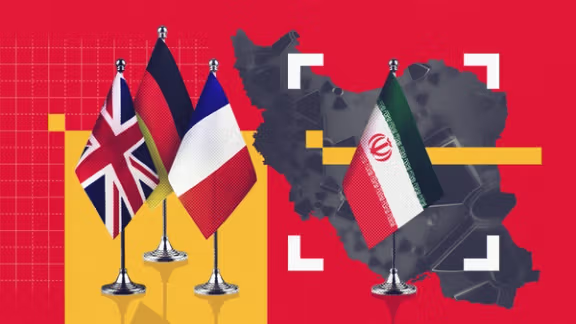
France, Germany and the United Kingdom have told the United Nations they are prepared to reimpose international sanctions on Iran unless it resumes nuclear negotiations with the United States and other powers, according to a letter shared by the French foreign ministry.
In a letter to UN Secretary-General António Guterres and the Security Council, the foreign ministers of the three European nations — known as the E3 — said they were ready to trigger the “snapback” mechanism under the 2015 nuclear deal if Tehran did not agree to talks before the end of August, or accept an extension to the deadline.
“We have made it clear that if Iran is not willing to reach a diplomatic solution before the end of August 2025, or does not seize the opportunity of an extension, E3 are prepared to trigger the snapback mechanism,” the ministers wrote.
The letter was first reported by the Financial Times and France's Le Monde newspaper.
The letter was signed by French Foreign Minister Jean-Noël Barrot, Germany’s Johann Wadephul, and Britain’s David Lammy, and comes two months after US and Israeli strikes on nuclear sites in Iran. The Iranian mission to the UN did not immediately respond to a request for comment.
Under UN Security Council Resolution 2231, which endorsed the nuclear accord, any signatory can trigger the reimposition of sanctions if Iran is deemed in breach. The sanctions — including arms embargoes, cargo inspections and restrictions on missile development — are set to expire on Oct. 18 unless renewed.
Extension for discussion
The Financial Times said the E3 told Iranian negotiators at talks in Turkey last month they would extend the August deadline if Tehran resumed discussions with Washington and restored cooperation with the International Atomic Energy Agency before September. One Western diplomat described those talks as “difficult.”
Iranian Foreign Minister Abbas Araghchi told the newspaper in July that the European powers had no “legal or moral grounds” for a snapback and warned they would be excluded from future nuclear talks if they went ahead.
Iran bracing for snapback
Separately, Iran International reported earlier this week that Iran’s Ministry of Intelligence has issued confidential guidance to ministries and major companies to prepare for the possible return of punitive UN measures.
The leaked document said renewed sanctions would target arms sales, freeze overseas assets, and reimpose restrictions on industries such as oil, petrochemicals, banking, shipping, insurance and sensitive technologies.
The ministry warned of “severe currency fluctuations, reduced purchasing power, increased unemployment, layoffs and heightened social discontent” if sanctions return, and urged companies to seek alternative suppliers in countries including China, Russia and Iraq. It also cautioned about heightened cyber threats to economic infrastructure.
Iran suspended cooperation with the IAEA in June following a brief war with Israel. A senior from the nuclear watchdog met with Iranian counterparts in Tehran on Monday.
'Iran has hand on trigger for NPT exit'
A senior Iranian lawmaker warned on Wednesday that parliament could move to withdraw Iran from the Nuclear Non-Proliferation Treaty (NPT) if Western powers reimpose the UN sanctions.
“If the other side takes steps toward operationalizing the snapback mechanism and using it, the Iranian parliament will definitely respond,” Manouchehr Mottaki, a member of parliament’s economic committee, was quoted as saying by Iranian media.
He said lawmakers were “ready to pull the trigger” on an NPT exit, adding that the West had no legal grounds to restore sanctions under the 2015 nuclear deal and was using the threat only as leverage.
“If they make their threat a reality, in line with the guidance of the Supreme Leader, we will also make our threat a reality,” Mottaki said.
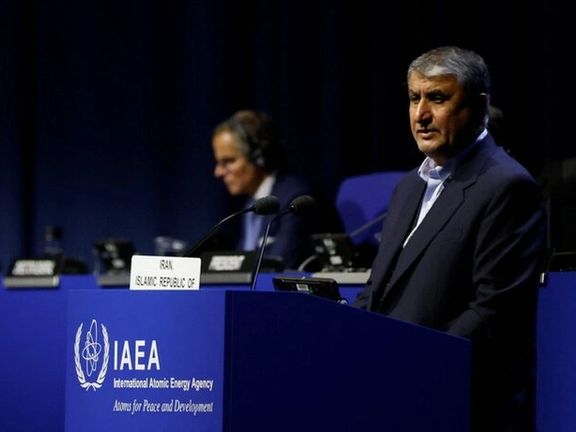
The head of Iran's Atomic Energy Organization has criticized Israeli claims about Tehran’s nuclear activities, saying the program is peaceful and the allegations are based on a distorted and inaccurate dossier.
“A fabricated and fake dossier created by Israel fuels accusations and pretexts — nothing but an attempt to stop our peaceful nuclear program,” Mohammad Eslami said on Tuesday.
Eslami also included the International Atomic Energy Agency (IAEA) in his criticism, saying the agency must condemn the killing of individuals involved in Iran's nuclear program in Israeli attacks, Revolutionary Guards-affiliated Tasnim News reported.
"The assassination of Iran's nuclear scientists, who had no military affiliations, is among their crimes, and such actions by the regime must be strongly condemned by the IAEA,” Eslami said.
Israel launched a surprise military campaign on June 13 targeting military and nuclear sites, assassinating senior Iranian commanders and killing hundreds of civilians.
The war, which lasted for 12 days, saw Israel kill more than 30 senior security officials and 11 senior nuclear scientists.
According to an Iranian government spokesperson, 1,062 Iranians were killed during the conflict, including 786 military personnel and 276 civilians. Iran retaliated with missile strikes that killed 32 people, including 31 civilians and one off-duty soldier.
On June 22, the United States carried out airstrikes on Iran’s key nuclear sites at Fordow, Natanz, and Isfahan.
"During the 12-day war, several registered facilities under continuous IAEA monitoring, with 130 inspectors, were repeatedly attacked with missiles and other projectiles,” Eslami added.
Iran also criticized the IAEA on Monday for what it called a failure to act over Israeli and US attacks in June, after talks in Tehran with the UN nuclear watchdog’s deputy director general earlier in the day.
“The Islamic Republic expressed its objection to the failure of the agency to fulfill its responsibilities regarding the Israeli and US attack, and raised its demands for correcting the agency’s improper processes,” Deputy Foreign Minister Kazem Gharibabadi said.
The Supreme Leader-affiliated newspaper Kayhan accused the IAEA in July of acting as a tool for Western intelligence.

Tehran moderates are openly signaling readiness for a return to nuclear talks, hinting at accepting some restrictions on its activities but Washington appears unmoved.
“We stated to the (US) negotiating party that we are willing to build trust, but it seems as though they have pretended to be asleep,” Vice President Mohammad Reza Aref said on Tuesday—the clearest suggestion yet that reluctance may be coming from the United States.
“Even direct negotiations can happen,” he added, under balanced conditions. “The Islamic Republic’s approach to negotiations is in line with what the people want.”
The remarks followed Deputy Foreign Minister Majid Takhtravanchi’s statement a day earlier that Iran was prepared to limit its nuclear program if US sanctions were lifted.
There was no public response by Washington.
US Secretary of State Marco Rubio along with foreign ministers of France, Germany and Britain set an informal end-August deadline for a new nuclear deal, warning failure would mean triggering the so-called "snapback" of UN sanctions.
‘No rush’
But no response came from Washington. President Donald Trump told reporters in mid-July that the urgency to engage with Iran had vanished after US strikes in late June.
“They would like to talk. I’m in no rush to talk because we obliterated their site,” Trump told reporters mid July, implying he was content to let pressure build.
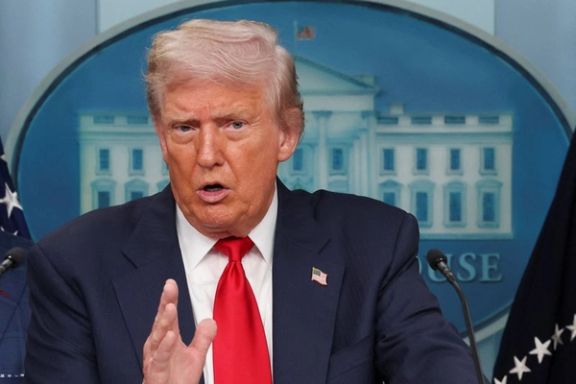
European officials have warned Tehran that unless it fully cooperates with the International Atomic Energy Agency (IAEA), the “trigger mechanism” for snapback could be activated, restoring UN sanctions this fall.
Red lines
Despite the conciliatory gestures, Iran’s red lines remain intact.
Takhtravanchi told Japan’s Kyodo News this week that Tehran would not relinquish what it called its right to uranium enrichment.
Officials also stressed that Monday’s visit by IAEA Deputy Director General Massimo Aparo was unrelated to inspections, and Tehran continues to bar IAEA chief Rafael Grossi, accusing him of complicity in the recent attacks.
Reformist daily Arman Melli called Takhtravanchi’s offer “a new prudent decision regarding the nuclear dossier,” noting Iran’s aim to avoid the trigger mechanism while securing sanctions relief to ease its deep financial crisis.
Hardline outlets, meanwhile, have expressed anger at the IAEA and the UN Security Council’s failure to condemn the strikes, and domestic critics warn that opening talks with Washington could be politically costly.
Divisions and outlook
While the Foreign Ministry and its diplomats remain cautious about re-engaging the West, the Presidential Office appears more eager to pursue direct negotiations.
Vahideh Karimi, political editor of Shargh, warned that the combination of Iran’s tentative flexibility and Washington’s hesitation could prolong the stalemate, calling Takhtravanchi’s proposal “realistic” but fragile.
She also pointed to Tehran’s missile program — repeatedly declared off-limits after the war with Israel — as a potential deal-breaker.
Others, like Ham Mihan columnist Majid Younesian, argue the balance of forces is shifting in Iran’s favor and that confrontation with the US and Europe must evolve.
“Change does not mean surrender, as hardliners claim. Not all problems need to be solved with guns, slogans, and provocations,” he wrote.